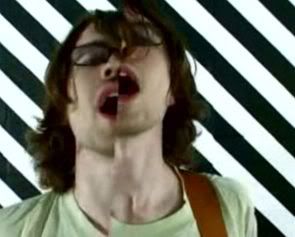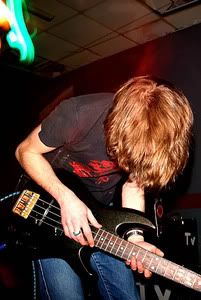Tom Vek: Interview

By Beth Mueller//November 6th, 2005.
Beth: Hey, Tom. Welcome to Washington, DC. How are you doing?
Tom: Good, good. I’m kind of losing my voice, so I must sound like a real beacon of health. But overall, I’m good.
Beth: I thought we’d start with some easy stuff, so let’s talk a bit about recording. I hear you’re sort of a whiz kid in the studio.
Tom: Umm not really. I wouldn’t really use “whiz kid.” I was lucky enough to get into a situation where I had a few bits of equipment to record with and that was quite limited, so I started really having to innovate quite a bit with the limited equipment. Being held back makes you kind of experiment more. So in that sense, it provoked a zany ‘trying things out to see how they sound’ type thing.
Beth: That process started out in your Father’s garage, yes?
Tom: Yeah. When I was about 14 years old.
Beth: What was that dynamic like—working with your Father?
Tom: Well, my Dad wouldn’t be recording. He actually worked from home and his office was on the other side of the wall. So sometimes he would come in and be like “Don’t play any drums for a bit, ‘cause I’m going to make a call.” And I’d be like, “Ok,” and switch gears to something else. Some other instrument.
And then, we had this thing called the “Wall Test.” Sometimes he would come in and say, “That really sounded good through the wall.” And apparently, if it sounded good through the wall it was some kind of award for music.
Beth: Did you start by playing all of the instruments by yourself? Or did you have friends come in?
Tom: I’ve been in plenty of bands with friends, you know, just school bands and college bands and stuff. But what I’m doing now is the stuff that I have always wanted to do. I just got into a position where I was playing enough instruments to be able to go about making an album by myself. And I could do whatever I wanted. I could concentrate on taking the songs wherever they wanted to go. It wasn’t going to have to be about filling roles, having to lay down a guitar track so the guitarist would have something to do.
So it’s kind of two things: I like being in a band. I like working with other creative people and being surprised by what they do and reacting off of each other. But in another sense, I do like to have control over what I’m doing.
Beth: How much of this process of creating music is marked by experimentation? Versus how much of it is based on a pre-formed idea of how the song should turn out?
Tom: The thing that fascinated me when I first got into recording really on was that it allowed you to do something that was impossible to do own your own. You could hear two things on top of each other. You could experiment and find the two notes that worked together and did something exciting. That’s what making music is all about.
I was so excited by it that I kept that kind of free working environment. A song will start with one riff, one single riff I can play on my own. From that point on whatever feels right is the route that the song is going to take. It’s quite nice to work in that way, because you don’t really write songs. You record songs. The songs kind of write themselves. And the final song ends up as something I was never really expecting.
Beth: To me, We Have Sound is full of contradictions. The songs are simultaneously lush and minimalist, dancey and subdued. It seems that if you turned up the guitar or added more of the slap bass, you could have made a full out rock album. Or if you turned up the drums or added synth, you could had a dance album. You could have taken the music in so many different directions.
Tom: I think that’s a nice way to describe it, thank you. But I can’t talk about it like it’s all deliberate. I kind of don’t want to take credit for it. It just happened that way.
Beth: Would you ever consider remixing the album for club play?
Tom: A lot more stuff has come out in the UK, in terms of singles and stuff. We have remixes done of all the singles. I’ve always been funny about remixes, ‘cause I grew up as a rock kid. And I really, really hated it when you would buy a single and there would be this lame house remix with vocals over a beat. So when it came to getting the first remix done, I was really apprehensive about it. But I think all of the remixes that we’ve gotten done have been really, really good. Like “If You Want” was really a re-edit of the song—it is twice as long and the kick is really compressed.
Beth: It has more pent up energy.
Tom: Yeah, the song was originally kinda drunk. And the remix is angry. Some remixes have been quite drastically different. And at the end of the day, I’ve liked how they’ve turned out.

Beth: I hate to do this to you… but you’re touring now with a band. How much do they contribute to your sound?
Tom: The band is for the purpose of turning the music live. It’s really weird. I do get asked quite a bit about how they affect my sound. And I’m like, why is there this assumption that I’m going to change what I’m doing? I’ve been in plenty of bands and known plenty of other musicians over the years but this album is a thing that I’ve chosen to do on my own.
Originally, when I was on a tiny record label, the question came up about what I wanted to live. And I just called some friends and got them involved. And it worked. When we’re out on tour and out on the road, it is like a band. There’s four of us, two in a room in hotels. It is a team effort. But I think, more fundamentally than that, the thing that got us all in this position is this bunch of music that I did on my own. To turn this into a band now, it wouldn’t be right.
Beth: How has the tour been going though?
Tom: It’s going good. Tonight will be the third show. The last two have been, well… they’re in kinda small venues with lots of character to them. The one last night, the Khyber in Philadelphia, was quite dingy. But that’s what being in a rock band is about.
Beth: This is really your first major tour of the United States. How do you find American crowds in comparison to British crowds?
Tom: It’s unfair to compare really, because we’re in quite different stages [of popularity]. My album only came out here last week. It’s been a lot of work and it’s taken a lot of time in the UK to get to the level that I’m at—not that it’s some amazing level, but you know. We’ve just got done a UK tour where a decent amount of people were coming out to each show. But yeah, [Americans] seem like nice people.
Beth: So after this tour, what’s next?
Tom: The album was actually finished in 2004, even though it was only released in this past year in the UK and even more recently in the States. This kind of delay is not uncommon in the music industry. But it’s fundamentally a good thing, because strangely enough we actually were able to re-license the album back to an independent label over here (Startime). This is an independent record and it’s great that it’s being introduced to people like that. But the end of this year is really the final push for this record.
Beth: So no mega world tour?
Tom: No, unfortunately. But it’s exciting, because I’ll get to go back to the studio after this tour. My next album is going to be better than this one. Yeah, I really don’t know what it’s going to sound like, but it’s going to be good. Laughs.
Beth: Mind if I ask you a couple of questions from our readers?
Tom: No, not at all.
Beth: You’re pretty young, only 24 years old. What would you be doing if you weren’t making music full time?
Tom: I only quit my job and the career path that I was taking before this at the very, very, very last minute. Because it’s wise to be slightly cynical in this industry about living the dream and stuff. I studied graphic design and was working as a designer for a year. That was the plan really. But it’s alright, I’m still sort of exercising it. I did the album art.
Beth: What is the origin of your last name?
Tom: I’m not feeling like lying today. It’s not an abbreviation. If you say my last name really quick, it sounds like Vek. It’s funny, I got an email from another Vek from Yugoslavia saying “I’ve been spending decades trying to track down my family and I thought we were the only ones.” I felt quite bad about that.
Beth: Who are some artists that you’re excited about right now?
Tom: There’s a band called Your Codename Is Milo, a British band. Kind of like intelligent rock, At The Drive-In ish. They would go well down here. There’s a lot of great music going on in the UK at the moment, underneath the kind of Bloc Party’s and the Kaiser Chiefs. There’s a band called The Chap, they’re amazing. I’d highly recommend their album. And there’s another British band called Clor. They sound like Nintendo pop.
Beth: Well, thank you for sitting down with me. I wish you the best of luck with the rest of the tour in the United States and your trip home at the end of the month.
Tom: Thank you.
Audio: "I Ain't Saying My Goodbyes"
Audio: "That Can Be Arranged"
Audio: "Nothing But Green Lights [Digitalism Remix]"
Video: "Nothing But Green Lights"
[Beth Mueller is a former music director at WGTB at Georgetown University in Washington D.C. You can listen to her show every Thursday from 4-6 Eastern. Beth will be an occasional Exitfare contributor.]




1 Comments:
zimivir 1000 mg is an antiviral medication utilized in the treatment of herpes labialis, genital herpes contamination, and herpes zoster diseases. It forestalls the increase of infections in human cells and clears up the contamination.
Post a Comment
<< Home